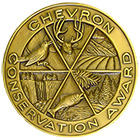Chevron Conservation Award letter from Gary Williams, Glenbard Township High School, honoring Dr. John H. Tanton
Gary Williams
Science Chairman
Glenbard North High School
990 Kuhn Road
Carol Stream, IL 60188
Chevron Conservation Awards Committee
Dear Friends,
When I heard that my long time associate, mentor, and friend, John Tanton, is being considered for a Chevron Conservation award, I asked for permission to send a letter on his behalf.
I have known John for more than 25 years, first as a young physician taking courses in field biology at the University of Michigan Biological Station and then as a co worker in early evaluation and the successful attempt to set aside northern Michigan's Sylvania tract. John was a major instigator of the movement to preserve the Pictured Rocks National Lakeshore, and organizer of the Little Traverse Nature Conservancy. He strongly supported David Hopcraft's efforts at raising native mammals on his Kenya ranch and the prevention of desertification of arid areas of the planet. Quite recently, he organized a letter campaign to Kenya's Attorney General to protect the Hopcraft property from government takeover. John was one of the early contributors to an understanding of population pressures and possible solutions.
In addition to his generous, unflagging efforts at protection of our environment, he has been a leader in the very best sense. His conservation examples extend to local recycling efforts, composting, conservation, and energy production. He tends to work in the background, shunning the spotlight, and leading by both precept and example. He is most generous in donation of his valuable time, often taking time from his busy schedule as chief of cataract surgery at Little Traverse hospital.
I often donate my time in the summertime or during the academic to help with projects of John's design. When we socialize, and I have the opportunity to observe him interact with his friends and patients, I am often reminded of the fact that John has never lost touch with his roots. His association and interchange with common people in northern Michigan or Kenya reminds one of his solid, rural, agricultural roots. His easy conversation about local concerns and international problems indicates a quick grasp of complex situations.
There is no one in my circle who has done more for his fellow man in efforts at general conservation. He is a true inspiration to those who know him. It is his opinion that I seek first on complex problems of a biological or almost any other sort. I have often commented that there is no person that I more
admire than John Tanton. It should be no surprise then, that I recommend him for this award in the strongest possible terms. He has my unqualified, enthusiastic support.
I'll gladly comment further as necessary.
Sincerely,
Gary Williams

